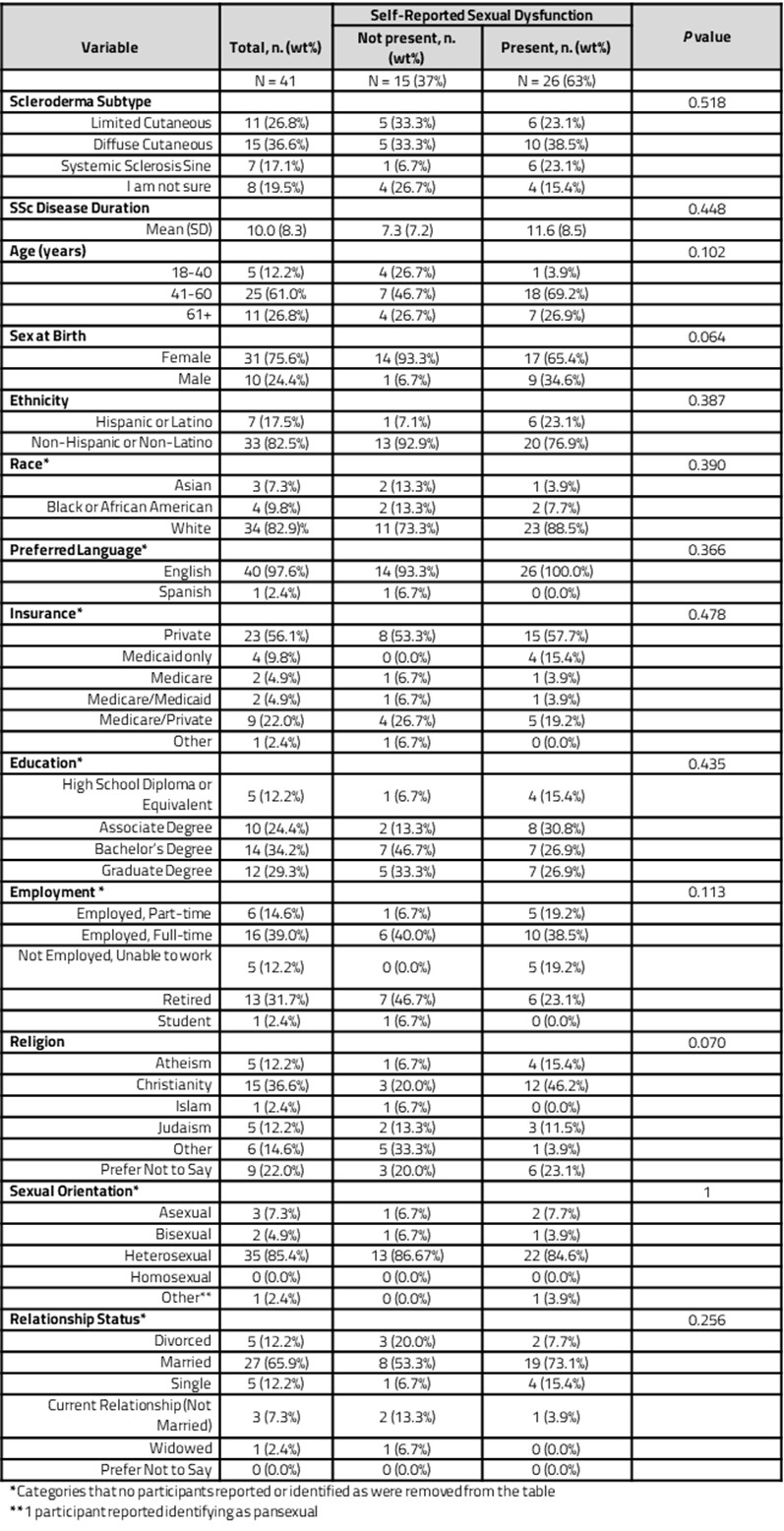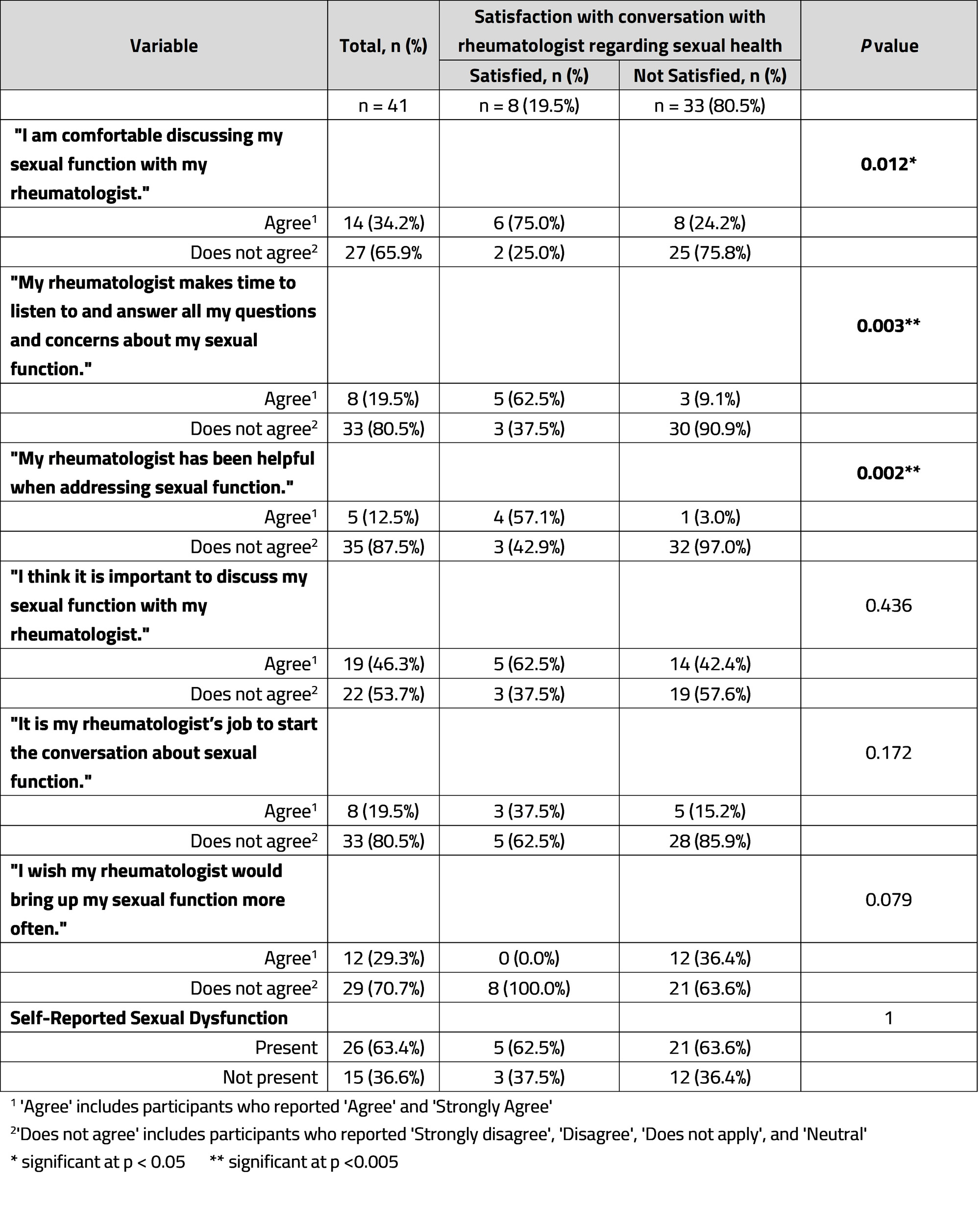Session Information
Date: Sunday, November 12, 2023
Title: (0609–0672) Systemic Sclerosis & Related Disorders – Clinical Poster I: Research
Session Type: Poster Session A
Session Time: 9:00AM-11:00AM
Background/Purpose: Few studies have investigated the prevalence and risk factors of sexual dysfunction among individuals with systemic sclerosis (SSc). The purpose of this study is to define, among individuals with SSc, (1) the prevalence and risk factors associated with sexual dysfunction, (2) the frequency of discussions regarding this subject, and (3) patient-perceived barriers to those discussions.
Methods: We developed the Sexual Function in SSc Questionnaire (SFSScQ) to anonymously survey individuals with self-reported SSc regarding their sexual function and sexual health discussions with their MD rheumatologist. Participants were asked to complete the SSFSScQ and to complete the Female Sexual Function Index (FSFI) or the International Index of Erectile Function (IIEF) Questionnaire based on self-reported sex. Participant characteristics between those with vs. without self-reported sexual dysfunction were compared using Fisher’s Exact test. Agreement to statements regarding potential barriers to sexual function conversations were compared between those who reported feeling satisfied vs. not satisfied with sexual health discussions using Fisher’s Exact test. Univariable and multivariable logistic regression were performed to assess factors associated with sexual dysfunction.
Results: 41 participants completed the SFSScQ; 30 (73%) also completed the FSFI or IIEF. 26 (63%) participants reported sexual dysfunction. Clinical characteristics of those with vs. without self-reported sexual dysfunction are shown in Table 1. In both unadjusted and adjusted regression models, age, sex, race, SSc subtype, and time since SSc diagnosis were not predictors of sexual dysfunction. Self-reported sexual dysfunction was not associated with the presence of sexual dysfunction on the scored questionnaires (p=0.431); 25% of individuals who self-reported sexual dysfunction did not meet scored questionnaire criteria (Table 2). 36 (88%) of 41 participants had never discussed sexual health with their rheumatologist, of whom 23 (64%) self-reported sexual dysfunction. 19 (46.3%) participants agreed that having conversations with their rheumatologist regarding sexual function was important. Most (33 (81%)) were not satisfied with the sexual health discussions they have had to-date (Table 3). Patients who were satisfied (vs. not satisfied) with their sexual health discussions more often felt comfortable discussing sexual function with their rheumatologist (p=0.012), believed their rheumatologist makes time to discuss sexual function (p=0.003), and felt that their rheumatologist has been helpful regarding sexual function (p=0.002) (Table 3).
Conclusion: A majority of participants with self-reported SSc indicated that they experience sexual dysfunction but have never discussed sexual health with their rheumatologist. No patient-level factors were identified as independent predictors of sexual dysfunction; however, our sample size is small. Self-reported sexual dysfunction was not associated with sexual dysfunction determined by scored questionnaires, suggesting that SSc sexual dysfunction may encapsulate disease specific complaints not captured by surveys designed for other populations.
To cite this abstract in AMA style:
Morales L, Spiera R, Gordon J, Jannat-Khah D, Lakin K. Self-Reported Sexual Dysfunction and Perceptions of Rheumatologist Engagement on This Issue in Patients with Systemic Sclerosis [abstract]. Arthritis Rheumatol. 2023; 75 (suppl 9). https://acrabstracts.org/abstract/self-reported-sexual-dysfunction-and-perceptions-of-rheumatologist-engagement-on-this-issue-in-patients-with-systemic-sclerosis/. Accessed .« Back to ACR Convergence 2023
ACR Meeting Abstracts - https://acrabstracts.org/abstract/self-reported-sexual-dysfunction-and-perceptions-of-rheumatologist-engagement-on-this-issue-in-patients-with-systemic-sclerosis/



